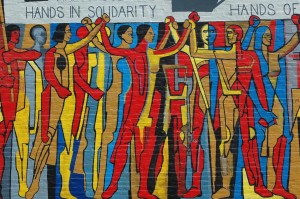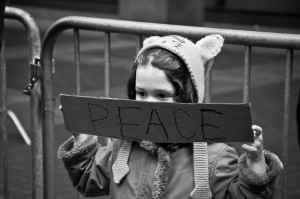A Deacon’s Musing|Solidarity – by Richard Manley-Tannis
Spirited Reflection – Sunday, May 11, 2014
Richard Manley-Tannis, a diaconal minister with the United Church of Canada, currently serves as Winnipeg Presbytery Minister for Evangelism, Mission and Church Development. In this new role, he hopes to bring a methodology and perspective that challenges the illusion that there is not enough. He believes that we are awash in abundance and potential and we have have the ability to embrace such reality with ‘eyes wide open.’
Living and striving to change the world is no easy thing. Living and striving for the Kingdom can be humbling, frustrating, tear making and – let’s face it – exhausting! So, why bother?
Whether you’re reading this from a context of secularity, humanism, faith or agnosticism (perhaps somewhere in-between), social justice requires us to know who we are, why we do what we do. If we don’t, it’s likely that – at some point – your own stuff is going to get in the way. And when that happens, the best of intentions cannot stop the inevitable hurt that will result.
I am rather excited to be writing this blog for KAIROS and – when I was asked – I was uncertain what I might offer from my own vantage as a Diaconal Minister in the United Church of Canada. My particular stream of ministry is commissioned to several aspects of the life of a faith community, one being Service. The work that KAIROS does continues to excite me. As I was reflecting on this time of year, it occurred to me that this Easter Season, in which Christians now find themselves, was an appropriate place from which to muse.

Solidarity Mural from the United Electrical Workers building in Chicago. Photo: Terence Faircloth, 2006. https://flic.kr/p/evbxT
In a previous blog, I explored the connexion between suffering, choice and solidarity as an Easter people. Since then, this opportunity feels like a fitting place in which to further explore the idea of solidarity.
Solidarity has a long and rich history. I think (as a church) the idea of solidarity can be understood as a shift from mission that was connected with conversion and making all people the same to a lens that sees the inherent wisdom and dignity in the Other. This shift, therefore, has allowed us to recognise our own failings and the danger that we now understand as colonialism. And – in looking into this mirror – when we are at our best, we might lament, but we should not be paralysed, whether by apathy and/or guilt.
I think that the Easter moment and this season is so very helpful, therefore, in musing and wrestling with why we do what we do and how we might understand solidarity. In the blog about suffering, I found these three statements helpful in this regard:
- Jesus CHOSE the path that led to enduring and suffering an execution that is unimaginable to me;
- Jesus CHOSE to walk with those who do not, did not, and will not have privilege; and,
- Jesus CHOSE suffering.
Privilege is one of the key mixing ingredients for the recipe of colonialism and therefore is central to recognise in order to shift to walking with, not directing or leading, others. This reality of the disparity of have and have not is as old as the Christian Sacred Scriptures. There’s a reason that the camel and the needle do not thread well: we (with privilege) create a story or narrative that reinforces our sense of entitlement. But (always that conjunction shows up) Jesus’ ministry was and is founded in the recognition that by letting go of that sense of entitlement, joy and awakening can and do occur. Of course, that means seeing suffering in the world …
There is joy in the Holy. There is light incomprehensible that bathes each of us. And – when we see it, experience it – we cannot but respond. As an Easter people, however, that will and does lead us into difficult places. When we are grounded, that sense of being exhausted, which I mentioned at the beginning of this musing, becomes light to carry. But it is there in the paradox that leads us all to liberation: joy and suffering are connected by the choices to which we awaken and the steps we take in turn.
As a poet often articulates much more succinctly than prose, perhaps I will leave you with this question and let Mary Karr, say the rest: what choices lie before you in which you might be helped to awaken by nurturing another to stand with dignity?
Descending Theology: The Resurrection
By Mary Karr
From the far star points of his pinned extremities,
cold inched in—black ice and squid ink—
till the hung flesh was empty.
Lonely in that void even for pain,
he missed his splintered feet,
the human stare buried in his face.
He ached for two hands made of meat
he could reach to the end of.
In the corpse’s core, the stone fist
of his heart began to bang
on the stiff chest’s door, and breath spilled
back into that battered shape. Now
it’s your limbs he comes to fill, as warm water
shatters at birth, rivering every way.
Source: Poetry (January 2006)









